| Xinjiang Today |
| From mud bricks to modern comforts | |
|
|
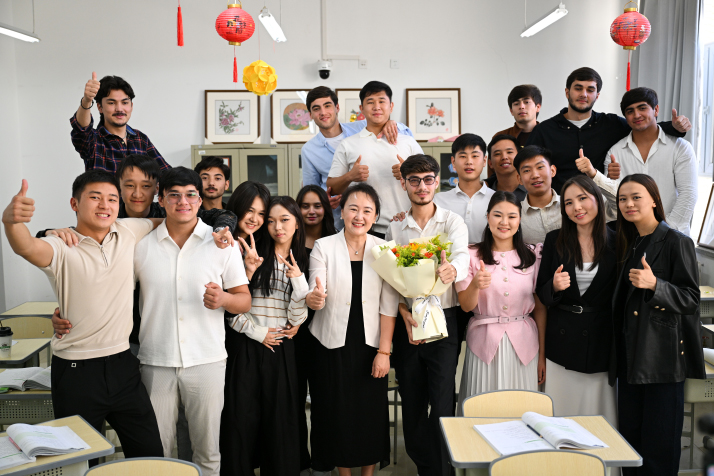 Students at the Xinjiang Normal University (XJNU) in Urumqi pose with their teacher Yan Li (front center) on September 10, Teachers’ Day (XINHUA)
As Xinjiang develops from a remote land into a hub of development, people's lives in the autonomous region have been dramatically transformed. Students from Xinjiang Normal University (XJNU) shared their personal stories of the changes in their hometowns and families, offering firsthand glimpses into the region's progress.
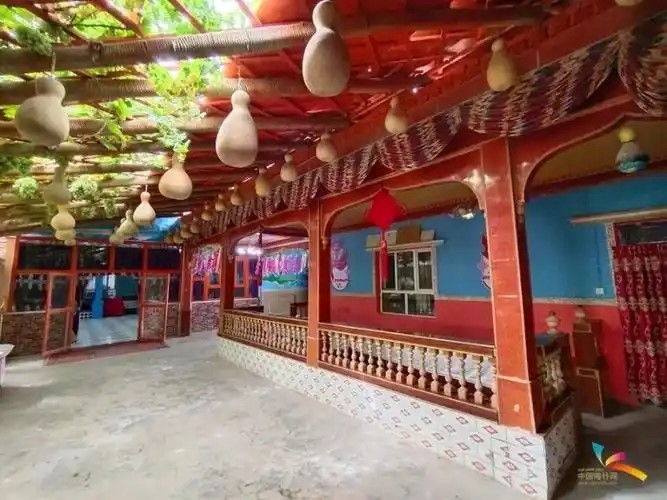 The new well-insulated and heated home of Abudukeremu Yakepu, an XJNU student of dance, in Jiashi County, Kashi (Kashgar) Prefecture (COURTESY PHOTO)
Abudukeremu Yakepu, undergraduate student majoring in dance at the School of Music I am from Bashiyingwen, a village in Jiashi County, Kashi (Kashgar) Prefecture. In the past, we lived in dilapidated mud houses, prone to leaks when it rained and freezing during the harsh winter. But today, thanks to extensive government assistance, we have sturdy, well-insulated and heated homes to live in. Our diets have also improved. Once limited, it now includes a variety of fresh produce and meats year-round, a testament to significantly improved transportation and logistics. 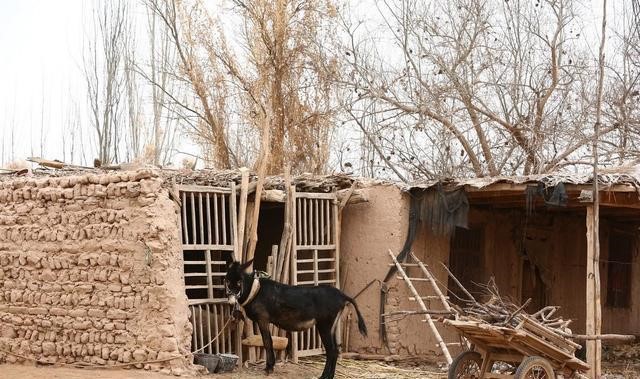 The leaky mudhouse in which his family used to live (COURTESY PHOTO)
When I was a child, my family's livelihood depended primarily on farming. The income was meager, and even with my father taking on odd jobs in addition to farming, it felt like a mere drop in the ocean. In recent years, our hometown has been vigorously developing specialty agriculture, expanding the cultivation of fruit like plums and melons. My family too grows plums. The government not only provides technical assistance but also helps in opening up new sales channels. Through e-commerce platforms, our plums are now reaching consumers across the country. Consequently, our income has increased substantially and our lives are improving. Today, schools that were once dilapidated have been replaced by modern facilities that have qualified teachers, ensuring that children get quality education. Access to healthcare has also greatly improved. The village clinics have been upgraded and have better equipment and skilled doctors. Abuduaili Abudureyimu, student at the School of Psychology When I stand on our newly renovated balcony in Pishan, a county in Hetian (Hotan) Prefecture, and see the lights of the hospital building in the distance, I remember the night shifts my mother used to do 10 years ago. Back then, she worked at the local hospital, and would go there on her decrepit motorcycle, a bumpy ride on dirt roads. She would return home around 3 a.m., in the dim glow of the streetlights. At that time we lived in a primitive one-story house. An outhouse in the courtyard served as our bathroom. In winter, we lit a stove to ward off the cold, and the family would huddle closely around it in the living room to watch television. But in recent years, Hetian has undergone remarkable transformations. My mother has been transferred to a newly built hospital with advanced diagnostic and treatment facilities where specialists offer new advanced medical treatment. This has significantly eased the challenge of getting treatment for complex diseases. We moved into a modern apartment that has underfloor heating and elevators. From our window, we can see a park and the sparkling lake in it. My mother has embraced online shopping, and she often orders fresh cherries and lychees. During festivals, neighbors and friends come over, each bringing a specialty dish. Auntie Ayiguli, who is from the Tajik ethnic group, brings her fragrant butter tea; Uncle Zhang, a Han, shares fish he's caught himself; and Uncle Reheman, a Uygur, brings his freshly baked buns. We have a merry and delicious feast on our table. 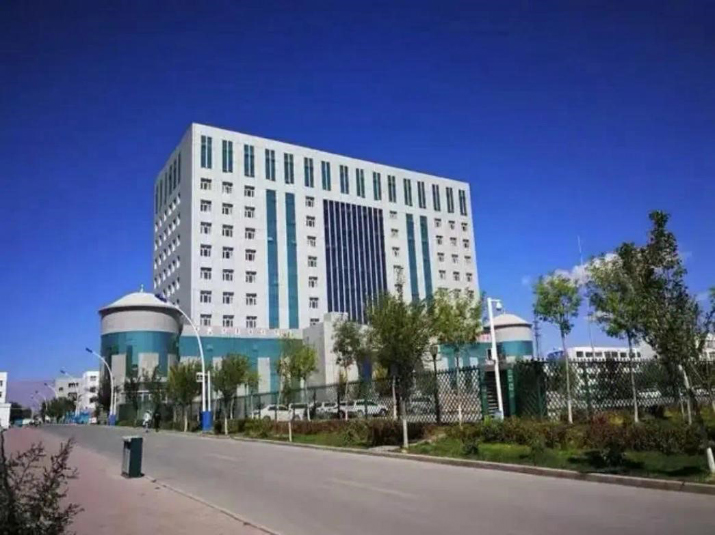 The Donggui residential complex in Hebukesaier Mongolian Autonomous County, Tacheng Prefecture (COURTESY PHOTO)
Ayinaer Hamitihan, School of Marxism I am from Hebukesaier Mongolian Autonomous County, Tacheng Prefecture. My childhood home was a basic mud-brick house, which offered little protection from the freezing winds. In the morning, we'd often find the water frozen solid in our basins. My father was a horse herder, which meant we lived on a shoestring. But things began to improve after we were relocated to another residential complex, the Donggui residential complex. I still remember the day we moved into our new apartment. My mother was astonished by the solid, smooth walls, completely draft-proof. Now, the winters are comfortably warm with ample heating, and even the plants on our balcony are thriving. Our modern kitchen, with its gleaming stove and refrigerator filled with fresh produce, is a true symbol of abundance. Every weekend, my mother cooks a large pot of fragrant pilaf, with the aroma filling our entire hallway; and neighbors drop by to share, bringing dishes they have cooked. My father now works as a technician at a local dairy. We sell the milk from our cows to the plant, and it brings in a steady daily income of around 200 yuan ($28). We also use some of the milk to make yogurt, which is sold to tourists. My mother can now take part in square dancing with her neighbors, and she often speaks of her joy at the significantly improved quality of our life. She's eagerly counting the days when my father buys a car so we can explore the beautiful poplar forests in summer. Bahezhuoli Matihasenmu, School of Political Science and Law Before 2010, earthen houses were the norm in our village, Daerte, in Gongliu County, Ili Kazak Autonomous Prefecture. The houses had cracks in the walls, and even though patched with mud, they would open again. In winter, we had to burn straw under our traditional brick beds, called kang, to heat the bricks but still, it was barely warm. I vividly remember the time I had high fever. My father rushed to the town clinic with me on his bicycle in the middle of the night. It was a bumpy dirt road and the wheels got stuck in the mud. Finally, he ended up abandoning the bicycle and carrying me piggyback for over an hour to reach the clinic. In those days, our granary was perpetually empty, and we could afford only a small piece of lamb during Eid al-Adha, one of the most important festivals for Muslims. Our lives took a significant turn in 2018, when we moved into a new apartment in the township. Our new home has underfloor heating, which means we can now watch TV in the living room in winter in just a thin shirt. My father took a subsidized loan to open an agricultural materials store. Its shelves are well-stocked with fertilizers and irrigation equipment, and his annual income has crossed 80,000 yuan ($11,231). Last year, he even bought a car. The Agaersen Town Middle School, where I studied, has a new sports ground, and renowned teachers in Urumqi give live lessons to the students, which are broadcast directly into the classrooms. 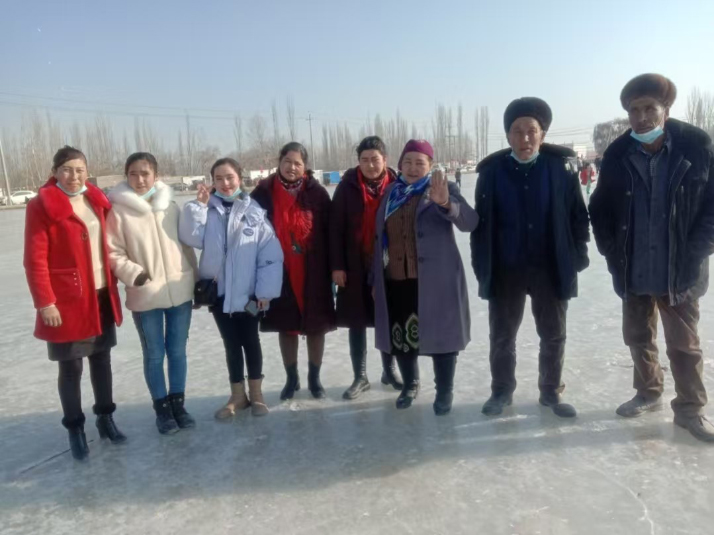 One of the prized family photos taken by the brother of Gulihumaer Yasen, an XJNU student, during the 2025 Spring Festival (COURTESY PHOTO)
Gulihumaer Yasen, majoring in environmental engineering at the School of Chemistry and Chemical Engineering Ten years ago, our earthen house in the village of Youkakekagatuer in Wushi County, Aksu Prefecture, offered little protection against the rains. When it rained, our beds would get soaked. But in 2015, thanks to government subsidies, we were able to build a new, spacious 80-square-meter house with modern glass windows that insulate us from both cold and heat. One of our most precious mementos is the photo my brother took of the family with his phone during the Spring Festival in January this year. My grandmother often says, "In the past, a full meal meant just naan bread with tea." Today, we frequently have stewed mutton and fresh grapes on the table. It now takes only 10 minutes by electric bike to reach the town bazaar for groceries, and the menu during festivals grows more plentiful with each passing year. From odd jobs, my father has successfully transitioned to managing a walnut orchard, tripling his annual income. As for me, I am studying at XJNU on a student grant. My 18-year-old sister, Zulihumaer, underwent surgery in Urumqi last year for a chronic illness she had for years. Medical insurance covered 80 percent of the cost. Comments to jijing@cicgamericas.com |
|
||||||||||||||||||||||||||||
|